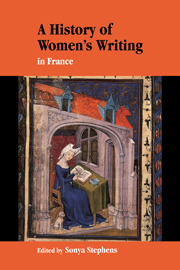Book contents
- Frontmatter
- Contents
- Notes on contributors
- Introduction
- 1 Female voices in convents, courts and households: the French Middle Ages
- 2 To choose ink and pen: French Renaissance women's writing
- 3 Altering the fabric of history: women's participation in the classical age
- 4 The eighteenth century: women writing, women learning
- 5 Eighteenth-century women novelists: genre and gender
- 6 The nineteenth century: shaping women
- 7 1900–1969: writing the void
- 8 From order to adventure: women's fiction since 1970
- 9 Changing the script: women writers and the rise of autobiography
- 10 Women poets of the twentieth century
- 11 Voicing the feminine: French women playwrights of the twentieth century
- 12 Feminist literary theory
- Bibliographies
- Index
3 - Altering the fabric of history: women's participation in the classical age
Published online by Cambridge University Press: 25 September 2009
- Frontmatter
- Contents
- Notes on contributors
- Introduction
- 1 Female voices in convents, courts and households: the French Middle Ages
- 2 To choose ink and pen: French Renaissance women's writing
- 3 Altering the fabric of history: women's participation in the classical age
- 4 The eighteenth century: women writing, women learning
- 5 Eighteenth-century women novelists: genre and gender
- 6 The nineteenth century: shaping women
- 7 1900–1969: writing the void
- 8 From order to adventure: women's fiction since 1970
- 9 Changing the script: women writers and the rise of autobiography
- 10 Women poets of the twentieth century
- 11 Voicing the feminine: French women playwrights of the twentieth century
- 12 Feminist literary theory
- Bibliographies
- Index
Summary
The seventeenth century presents an intriguing paradox. The dominant image of France's canonized classical age is the all-powerful monarch Louis XIV (ruled 1661–1715), a man who reduced the nobility to puppets and harnessed every discourse – literary, historical, philosophical – to pull his own chariot modelled on Apollo's. This would hardly seem to be a fertile milieu for female creativity. And yet seventeenth-century France witnessed a veritable explosion of women's participation in the literary and intellectual realm. During the years 1640–1715 alone, there were over 220 women who actively participated in the literary scene. They shaped that scene in an unprecedented fashion, and their innovations as both producers and consumers had a profound and long-lasting influence on the French literary tradition.
To what can this seemingly sudden upsurge in women's participation in the literary field be attributed? While the sixteenth century had its literary luminaries, there was not a strong female literary tradition upon which seventeenth-century followers could draw, as would be the case for the eighteenth century. There is no single explanation for this seventeenth-century phenomenon; rather one must speak of a confluence of historical and intellectual factors that together produced the powerful female literary tradition of this period.
In terms of history, sixteenth-century France did leave a legacy of strong female actors on the political stage.
- Type
- Chapter
- Information
- A History of Women's Writing in France , pp. 64 - 83Publisher: Cambridge University PressPrint publication year: 2000
- 4
- Cited by



